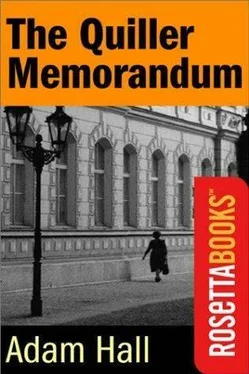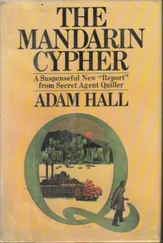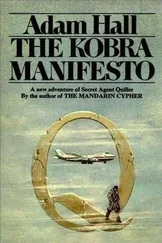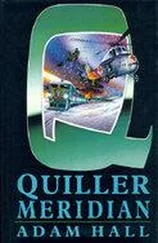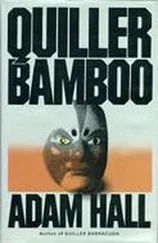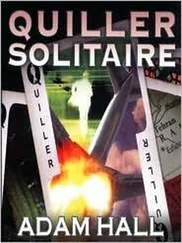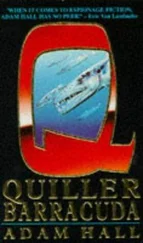The first self-pity had passed and she spoke without emotion, sitting hunched with her arms across her knees, her body as black and angular as the chair behind. Her gold hair made the only softness in the room.
"The ground began shaking and people said there were Russian soldiers coming. The whole Bunker shook and there was nowhere to run. I stayed with the Goebbels children because the grown-ups frightened me now, but then my mother took me away from them and I never saw them again. I knew they were dead. I didn't know for a long time afterwards that it was my mother who had given them the capsules. Of course it was on the orders of Frau Goebbels. There were six of them. Six children."
She opened her eyes but didn't look at me. The wolfhound watched her, worried by the pain in her voice. "The grown-ups frightened me and now even the children had gone. I didn't know what to do. Once I ran to Uncle Guenther when I saw him standing alone at the end of a passage but he told me to go away. There was nowhere to go. Then I saw Goebbels and his wife come into the passage and walk past Uncle Guenther, who had a big can in his hand. I could smell petrol. When I heard the shots from the garden I screamed, but Uncle Guenther didn't even hear me – he simply went out to the garden. I didn't understand anything any more."
Guenther Schwaegermann had been Goebbels's adjutant. His orders had been to smother the bodies in petrol and cremate them.
"That night my mother took me away. We were with a lot of other people. The ground was shaking and the whole sky was red. There were four women in our party; one of them was the cook. She kept running ahead and the others kept pulling her back, because the Russians were shelling heavily and the whole length of the Friedrich-strasse was on fire. We got as far as the Weidendammer Bridge before I fainted; but I can remember water, and the smell of smoke."
She got to her feet so suddenly that the dog gave a low bark. The curtains were not drawn across the windows and the glow from the street lit her face as she stared down.
I waited, and went on waiting. I didn't move, even to ease the tension in my legs, because I knew the dog was on edge because of her voice. She was statue-still, her thin arms hanging loose from the shoulder, her head forward to stare at the scene below that she wasn't seeing.
"That was when the rot set in… In the Bunker. When they took Uncle Hermann out and shot him, my own life was altered, in that minute. When the grown-ups began to frighten me with their strangeness I ran back to the only people I could understand – the children. Then they were taken away from me and I knew they were dead too. With nowhere to run next, I felt the whole of the earth moving under my feet, and I knew that the soldiers were coming. But there had to be something I could reach for and trust in. Not my mother, because she was like the other grown-ups, strange and tormented, and I'd seen her coming out of that room where the children were, and knew what had happened. Only someone very powerful could help me now, someone who could never die and who would always be there to help. The only god I had ever been told about was the Fuhrer."
Suddenly she was looking down at me and because of the angle of the light from the street the lower part of her face shadowed her eyes, and I couldn't see their expression.
"It's called a trauma, isn't it? A psychic injury setting up a neurosis."
It seemed she really wanted an answer, so I said:
"I prefer the simpler phrase you used."
"What was that?"
"The rot setting in."
"It's the same thing."
"But a different attitude. The thing is to keep your feet on the ground instead of up on a couch."
"I don't go to psychiatrists any more."
"Then you're the only one in all Berlin who doesn't."
"I tried them."
"Gave them up?"
"Yes."
"Now you go to the Neustadthalle instead."
"Do you know why?"
"To rake muck with the rest of us, knowing that it's his muck. The only successful cure for alcoholism is the nausea drug that teaches you that you can't go on loving something that makes you sick."
I had to be careful not to touch on the question that would have to be answered before I left here. I wanted her to tell me without being asked.
"You understand me very well," she said.
"It's not a very complex situation."
She came and stood over me. She had a way of standing bullfighter-fashion in the black slacks, legs straight, buttocks tucked flat and thighs thrust forward, the hard line of her body curved and tensioned like a bow. In a more feminine woman it would have been provocative; with her it suggested challenge.
"Why did you come here?" she asked me.
"It was an alternative."
"To what?"
"Going to the police."
Her eyes narrowed to slits of light blue under the lids.
"The police?"
"I was a witness to an attempted murder. It was my duty to make an immediate report."
"Why didn't you?"
"Two reasons. You might have been suffering under delusions. That could have been what it looked like: an accident caused by a skid. Also I'm English and in England we tend to trot out our troubles to the nearest policeman because that's what he's there for and we know who he is. In your country you don't. I had to bear that in mind."
"You don't trust our police?"
"I'm certain they're a fine body of men but yesterday they arrested one of their highest officials on a mass-murder charge – the Chancellor's chief security man. It shows their strength. And their weakness." I stood up and found my glass. It was empty and she took it from me.
"You haven't explained why you came here."
"Again, it was an alternative. I suggested a bar. You suggested here."
"I wanted to talk to you."
'To someone. Anyone."
"Yes. It was a shock. Did you think I hadn't any friends?"
"I still think you haven't. People with friends don't want to talk to strangers." She gave me another drink and her face looked bleak. The arrogance had suddenly gone. I added: "The silliest people can't move for friends. You see them at parties all over the place."
Her body had gone slack. "You made it easy to talk to you. It must have sounded a little hysterical. Do you dismiss me as a psychopath with a persecution complex?"
"Hardly. Someone's just tried to kill you a second time and you didn't even mention it."
"There's nothing to say about it."
But I still had to get that question answered before I left. She didn't dodge it. She didn't even see that I must want to know.
Suddenly it came. "They've got their reasons."
"They?"
"The Nazi group."
"The Nazis have their reasons for exterminating someone who's half in love with Hitler?"
"Must you put it like that?"
"Obsessed with the image of a dead god."
Her shoulders were still slack. The defiance was over. The catharsis of the confessional had left her exhausted. She said almost without interest: "I joined their group when I was just out of college. They call it Phoenix. It was a foster-parent to me because my mother never got to the other side of the Weidendammer Bridge that night. A piece of shrapnel hit her. Then I began growing up, and two or three years ago I defected and left the group. Not suddenly – I just stopped going to that house. They found me and tried to make me go back, because I knew too much. I knew what people had left the Fuhrerbunker alive, and where some of them went. I know where Bormann is now. I refused to go back but I swore on – on something they keep there that I would never talk. Either they think I've talked, or there's a new man there, or a new policy, because there was the trolley-stop incident a month ago, and the car tonight."
I finished my drink. I was going.
Читать дальше
